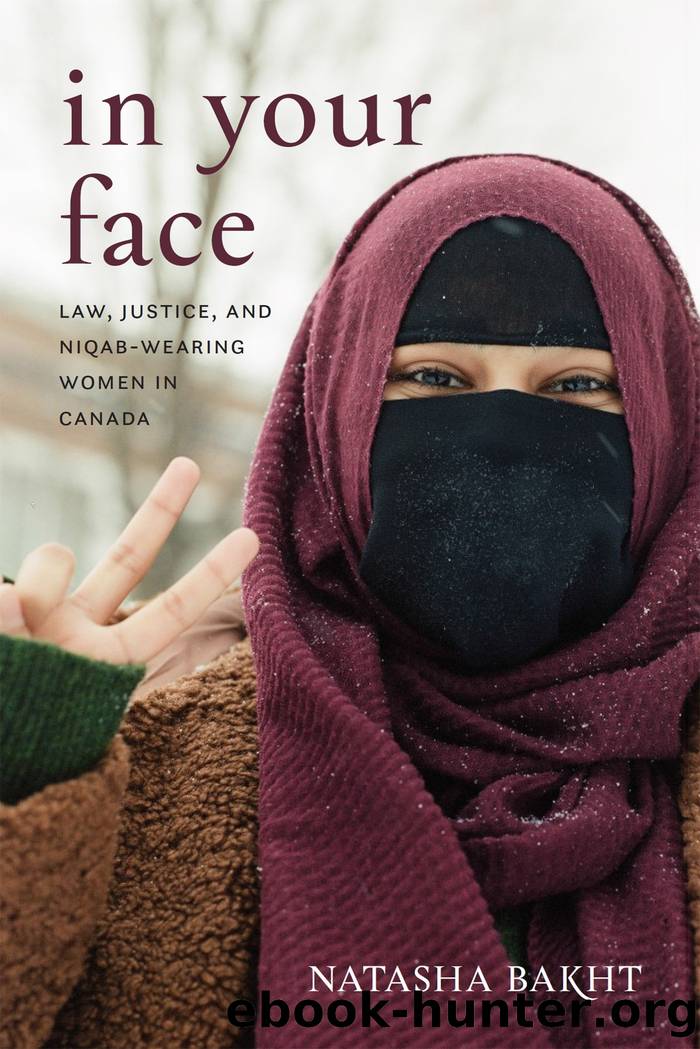In Your Face by Unknown

Author:Unknown
Language: eng
Format: epub
Publisher: Irwin Law Inc.
Published: 2021-05-19T00:00:00+00:00
Part III: The Consequences of Face-Veil Prohibitions on Niqab-Wearing Women
ALTHOUGH NIQAB-WEARING WOMEN HAVE opposed and continue to fight constructions of their identity that falsely oust them from belonging to the nation,134 the consequences of niqab bans for these women are dire. In addition to having serious implications for their overall well-being, these bans also undermine their efforts to enact belonging in the long-term.
Niqab bans violate a whole range of womenâs rights, including religious freedom, expression, equality, liberty, and security of the person. They implicate multiple rights because the scope of the bans is generally far-reaching, affecting a wide variety of human activity. Bans such as those found in Europe that criminalize womenâs dress and restrain them from being in public spaces can be very weighty. The inability to move about freely and the consequences of having a criminal conviction can severely impair oneâs ability to easily negotiate various aspects of society.
Niqab bans such as Québecâs new law generally implicate the right to work and the receipt of public services. Bill 2i, for example, completely curtails the ability of niqab-wearing women to work in the public service and potentially bars them from certain private sector jobs.135 In spite of popular misconceptions that niqab-wearing women do not or cannot work in the paid labour force, in fact many Muslim women who wear face veils need to economically support themselves and their families and want to advance a career, earn a living, and contribute to society.136 Several niqab-wearing women, including affiants to the constitutional challenge to Bill 62, are studying at university with a view to eventually working in Québec.137 With the Québec government being a major employer in the province, the inability to work in the public service is not an insubstantial disadvantage.138 Compared to the private sector (and despite bills 62 and 21), the government has arguably been a progressive employer willing to make accommodations for some minority communities.139 The ability to earn a living and have some economic autonomy gives women the freedom to make choices contrary to the wishes of those who are closest to them. If it were true that niqab-wearing women were being forced to wear the niqab by their parents or husbands,140 limiting their economic choices would not enable them to âfreeâ themselves from these situations. Niqab bans specifically erect barriers that prevent women from participating fully in society, making their lives much more arduous.
The denial of state services, whether an outright denial for those who cover their faces141 or where the receipt of services is likely to be applied in a discriminatory manner,142 will unduly affect many aspects of niqab-wearing womenâs lives. Women experience higher rates of poverty143 and are thus more likely to require public services such as public transportation and social assistance. Because women continue to be the primary caregivers for children, the elderly, and those who are ill or disabled,144 they will also be acutely impacted by the requirement that an individual must show their face in order to access daycare, public
Download
This site does not store any files on its server. We only index and link to content provided by other sites. Please contact the content providers to delete copyright contents if any and email us, we'll remove relevant links or contents immediately.
Men In Love by Nancy Friday(5240)
Everything Happens for a Reason by Kate Bowler(4743)
The Immortal Life of Henrietta Lacks by Rebecca Skloot(4587)
Why We Sleep by Matthew Walker(4445)
The Sports Rules Book by Human Kinetics(4386)
Not a Diet Book by James Smith(3425)
The Emperor of All Maladies: A Biography of Cancer by Siddhartha Mukherjee(3162)
Sapiens and Homo Deus by Yuval Noah Harari(3071)
Day by Elie Wiesel(2782)
Angels in America by Tony Kushner(2662)
A Burst of Light by Audre Lorde(2607)
Endless Forms Most Beautiful by Sean B. Carroll(2482)
Hashimoto's Protocol by Izabella Wentz PharmD(2375)
Dirty Genes by Ben Lynch(2317)
Reservoir 13 by Jon McGregor(2302)
And the Band Played On by Randy Shilts(2209)
Wonder by R J Palacio(2207)
The Immune System Recovery Plan by Susan Blum(2058)
Stretching to Stay Young by Jessica Matthews(2045)
